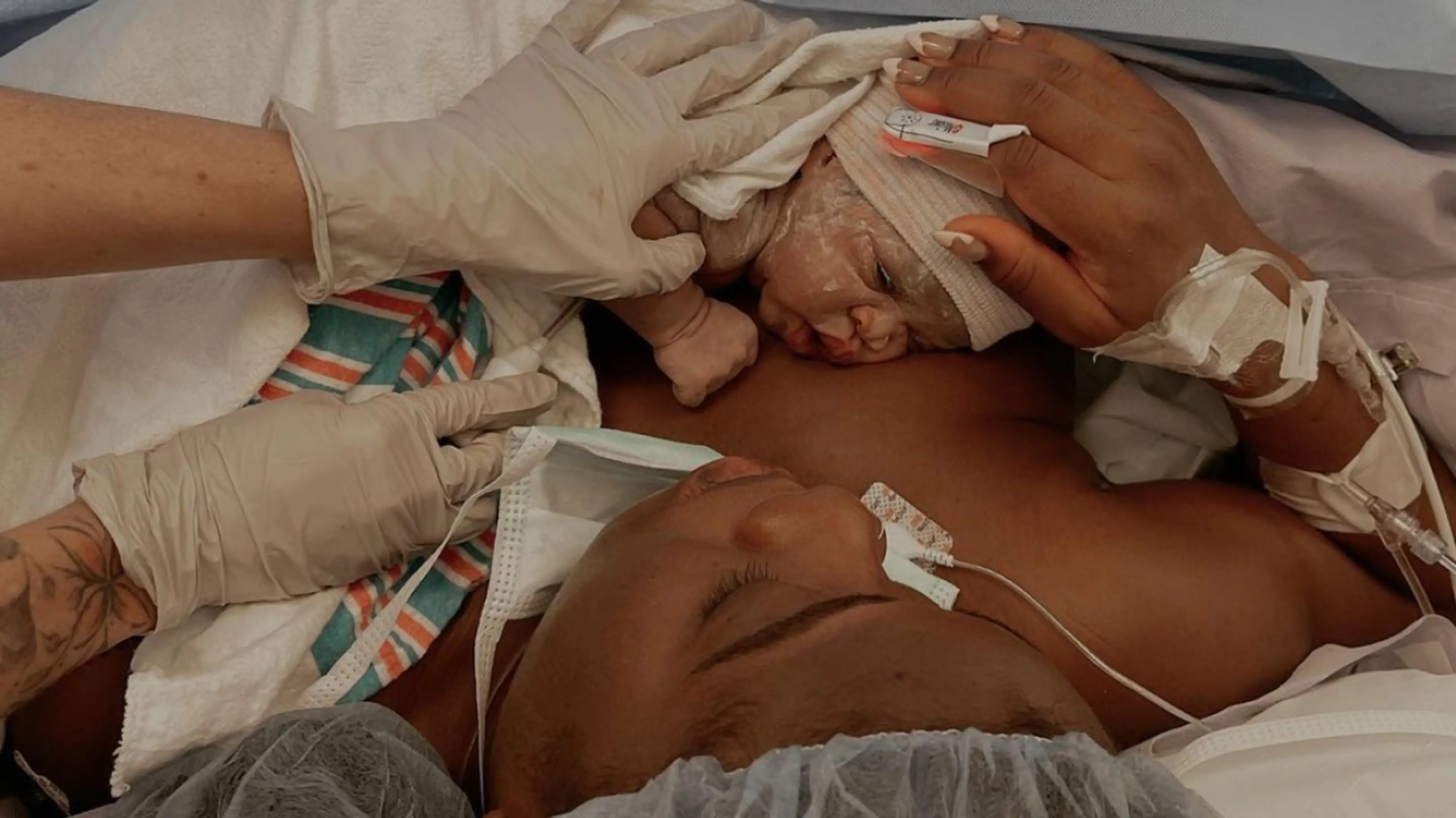TLDR: When you’re pregnant for the first time, you’re probably curious or even a little nervous about labor. We asked a doula all the biggest questions first-timers may have, including how to know if you’re in labor, what contractions feel like, what to do while you’re laboring at home, and what to expect if and when you go to the hospital.
I can still feel the anticipation of what labor would feel like.
In the weeks leading up to giving birth to my daughter, I felt both excited and nervous as I drew closer to my due date. Each day, my mind would race about how and where labor would begin, what it would feel like, and how my birth was going to play out.
Then, one Saturday evening, two days shy of 40 weeks pregnant, I felt my first contraction while sitting alone in my living room.
My initial reaction was pure confusion. I had no idea what a contraction was1 or wasn’t, so I sat still for an hour until I could confirm that the sensation was increasing over time. Once I realized that it was labor, I walked into my bedroom, told my husband to keep sleeping, and went back to the living room to labor alone.
There I sat, scared to move and wondering when I should go to the hospital. The truth is, while laboring at home, I had no idea what to do with myself. I felt frozen and lost.
Five hours later, I broke into uncontrollable chills, woke up my husband, and told him it was time to go. I arrived at the hospital, lay on a bed and remained there for eight hours until giving birth to my daughter.
Looking back, I can see the most important thing missing in my labor was knowledge. I had no idea what I could or couldn’t do during labor, which left me moving from a place of fear rather than confidence.
It’s because of this that I reached out to Samantha Huggins, one of the co-founders of Carriage House Birth2 , certified birth doula, mother of two, lactation counselor, and childbirth educator, to find out everything there is to know about labor.
What are the first signs of labor?
Samantha Huggins: This is one of my favorite questions because this is where we get to start to dismantle what we have been conditioned to believe is birth. Obviously, there’s the media version of birth, which is what so many of us think is what’s going to happen, which is this like explosive water breaking somewhere public. However, it can actually be quite different than that. For example, your water does not have to break. Though your water breaking could be a sign that labor is imminent, it could also mean that your labor hasn’t started yet. I’ve seen people go into labor a day after their water broke or even three days later. So yes, water can be a part of it, but it doesn’t have to be. The other side of this is that you can have a full labor and your water never breaks. So, ultimately for us to be in labor there’s only one word involved, and that’s “contractions.”
You must be having contractions to be in labor. Mostly, those contractions will be very inconsistent and spread out, but eventually, there is an active contracting pattern. You may also see a mucus plug or a bloody show, which is a little bit of pink blood or red blood often mixed with mucus.
What do contractions feel like?
SH: A lot of people describe the very earliest labor contractions as feeling like a little bit of food poisoning or menstrual cramps. They are usually very irregular and very crampy at first, and then, as your uterus tones and becomes more organized, the contractions intensify and you may feel the sensation as more of a wrap-around feeling around the center of your body.
What time of day do most people go into labor and why?
SH: Most people typically go into labor somewhere between three and five in the morning because their brains are off. When our brains are off, we are not stressing, meaning we’re not making cortisol. This gives our body the space to make oxytocin3 , which is what makes contractions happen.
What should you do during the hours that you labor at home?
SH: If you’re laboring at night, we encourage you to use water. Water is great because it helps to soothe you and allows you to focus and discern where you are in your labor. In short, it helps you to go inward. To use water, you could take a bath, take a regular shower, or take a shower where you sit on a big exercise ball that has a towel over it to avoid slipping, and just let the hot water run down your back.
Next, we recommend resting. Rest can stop contractions sometimes, which is okay, because it’s ideal for you to get sleep. Rest as much as you can because you don’t know how long your labor will be, so plan for a long labor.
For laboring during the day, we have a different approach. In our Carriage House childbirth education classes, we encourage people to make a long list of the things you’d want to have at home if you were stuck inside for two days. What foods and drinks would you want? What movies, playlists, etc.? What things would comfort you? What things would make you feel good? While in labor at home during the day, use this list to help support you through the process.
Also, we encourage interacting with your environment if that’s something that feels right to you and is available, either by staying inside or going outside. This could mean walking around the block, hanging out in your backyard, taking your dog for a walk, etc.
What should you not do while laboring at home?
SH: What we don’t want you to do is turn every light on in the house, start an Instagram live, call your whole family, or Google signs of labor. We want you to go inward at this time.
When do you recommend a laboring person go to the hospital?
SH: If there is a reason that the birthing person says that they want to be at the hospital or a birth center, then that’s exactly where we should be, even if I know for a fact that they’re only one centimeter dilated, and we still have a long road ahead of us.
However, this could also depend on when your care provider wants to see you, too. So, it’s kind of whichever one comes first, you deciding to go or going when your care provider wants you there. This can also depend on what kind of birth you want. If you want to be medically managed with an epidural, then maybe you go when your contractions are five minutes apart, very strong, and lasting for one continual minute for one hour.
What are signs that you should go to the hospital when in labor?
SH: The things that I look for that make me step outside of my comfort zone would definitely be blood. There’s good blood and there’s bad blood, and I suggest talking with your care provider about what the difference between those two are. It’s a really great conversation to have.
Another thing is how you are doing emotionally. I know many care providers ask on a scale of 1 to 10 rate your pain, but really the question that we should be asking is “How are you coping?” or “How are you feeling right now?” And if you told me that you were not feeling well, or that you’re scared and we can’t get to the root of why you’re scared, then it’s time to go because we need to change the environment and get you into a safe space, because we can’t have babies unless we feel good, safe, and supported.
What can you expect once you get to the hospital?
SH: I think one of the big things that happens for first-time parents upon arriving at the hospital is that they underestimate the gravity of what happens between home and hospital, which is that you surrender your control. For some people, this is really welcome. They feel like the pressure is off and it’s not all on them anymore. If this is what you signed up for and wanted, great. However, if that’s not what you’ve signed up for, this realization can be very overwhelming.
Aat the hospital, what are some tips you recommend to do for your mind?
SH: We encourage families to bring a few comfort items from home. This could be anything that means something to you, such as a stone, a handkerchief, etc., that you infuse with thoughts of peace while pregnant. Then during labor, this comfort item acts as a real-time physical reminder that you still have some ownership over something.
Another thing you can do is take a deep breath. Breath is this beautiful gift that you can’t forget at home with your keys and wallet. It’s always with you. You can take a breath whenever you want, and there’s no right way to do it. It’s just yours and you do it the way it feels good to you. You can also bring music to listen to in your headphones and listening to one of your meditations can be so helpful as well. Think about it—if you’re sitting in triage, and you have monitors on and they’re listening to the baby's heartbeat, what could be more beneficial than taking a moment to tune in with you?
Can you eat or drink during labor?
SH: Eating and drinking really depends on your care provider. If you’re having a home birth, obviously you can eat indefinitely. If you’re having a birth center birth, most birth centers will let you eat until you’re not hungry anymore.
Drinking, again, depends on the hospital. Some hospitals say clear liquids are okay, which could even include bone broth and miso and other things, whereas other hospitals would say absolutely no to all of those things. I have been to hospitals where they’ll let you have ice chips. I’ve been to hospitals which let you have sips of water. I’ve been to hospitals where they’ll tell you you can eat a whole sandwich. So, again it depends.
Can you go to the bathroom during labor?
SH: I think anyone should be able to go to the bathroom whenever they want to. In my experience, people can go to the bathroom as long as they don’t have an epidural. If they have an epidural, they’re probably going to have a catheter, so that solves that.
How do you stay present during labor if it doesn't go as you planned?
SH: When I help people prepare for birth, it’s with the understanding that birth is a little bit like a rollercoaster ride in the dark. We accept that we know where the ride starts and ends, but what we don’t know is what happens in the middle. So there are two ways to ride—one is very rigid where we don’t have fun, and instead bounce around, bump our heads, and resist—and the second is, we just let the ride take us and see how it unfolds.
So, if something does happen that we aren’t prepared for, I encourage going back to the breath. It’s never too late to soften into an idea. There’s always an opportunity for us to learn and to be able to do something in a peaceful and beautiful way. There’s not one way to birth. Birth is birth. So just try to stay as focused and centered as possible.
What is the number one thing you wish everyone knew about labor?
SH: The number one thing is that labor is perfectly unpredictable and perfectly imperfect. Remember that just because it’s a natural process doesn’t mean that it’s easy. Have patience, be soft, and kind to yourself.










